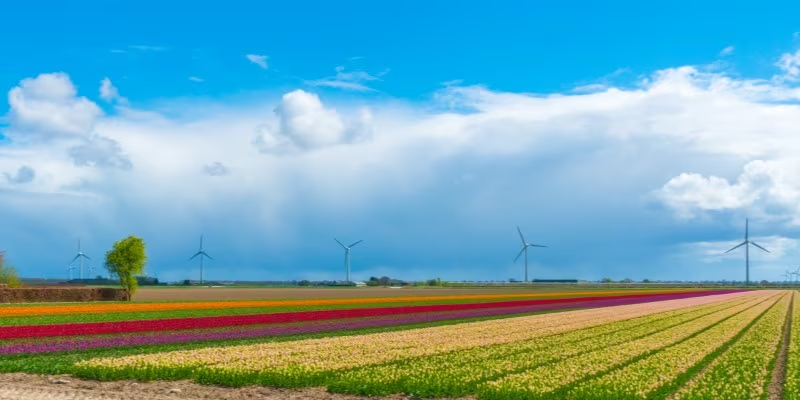Stay in the know on all smart updates of your favorite topics.
Waag Open: Electric Garden

In de hoop dat technologie ons uit de klimaatcrisis redt, worden er miljoenen geïnvesteerd in technologieën op het gebied van kunstmatige intelligentie. Tegelijkertijd genereert de hele IT-industrie nu al 900 Megaton aan CO2 per jaar. Dat is zeven keer zoveel als de uitstoot van heel Nederland in 2023. Technologische innovatie en een gezond ecosysteem lijken niet samen te gaan. Kunnen technologie en natuur samenwerken bij het redden van onze planeet?
Kunstenaar Sunjoo Lee experimenteert in haar project ‘Electric Garden’ met een elektriciteitsproducerende tuin. Zolang het ecosysteem in haar tuin bloeit, kan elektriciteit worden opgewekt. Tijdens deze Waag Open in juli maken we een eigen Electric Garden in de Waag. In een boeiende workshop neemt Sunjoo je mee in de wereld van regeneratieve technologie en leer je hoe de natuur als duurzame energiebron kan fungeren.
Programma
| 19:15 - 19:30 uur | Inloop |
|---|---|
| 19:30 - 19:45 uur | Welkom & introductie |
| 19:45 - 21:30 uur | Workshop Electric Garden |
Over Electric Garden
Electric Garden verkent op creatieve wijze de mogelijke samenwerking tussen natuurlijke ecosystemen en digitale systemen. De tuin produceert elektriciteit via het metabolisme van anaerobe bacteriën die in natte grond leven, met behulp van een technologie die Microbial Fuel Cells wordt genoemd. Elke container werkt als een batterij en is uitgerust met elektroden die de elektronen oogsten die door de bacteriën worden uitgezonden. De planten en insecten in de tuin voeden de bacteriën. Zolang het ecosysteem bloeit, kan elektriciteit worden opgewekt.
Over Sunjoo Lee
Sunjoo Lee is een interdisciplinair kunstenaar. Haar werk bevindt zich op het snijvlak van kunst, technologie en ecologie. Ze is gevestigd in Nederland en Zuid-Korea en is gefascineerd door het gebruik van elektronica en digitale hulpmiddelen die het menselijk belang overstijgen. In haar werk verkent ze onderwerpen als meer dan menselijke filosofie, emergentie, biomimicry, toekomstige vormen van symbiose en permacomputing.
Waag Open
Elke eerste donderdagavond van de maand opent Waag haar deuren! Kom langs om te discussiëren en te doen. Want we gaan niet alleen in discussie over maatschappelijke thema's en de toekomst – je leert daarnaast ook altijd iets praktisch. Iets dat je altijd al hebt willen uitproberen, zoals de 3D-printer in het FabLab, of juist iets dat je nooit had verwacht, zoals uitpluizen hoe DNA in elkaar zit in ons biotech-lab. Waag Open vindt plaats in de maakplaatsen op de eerste en tweede verdieping van het historische Waaggebouw op de Nieuwmarkt.
Toegankelijkheid
Mocht je krap bij kas zitten en wel graag aan dit evenement willen deelnemen, neem dan contact op met sanna [@] waag [punt] org.
A Lab Open Huis. Met exposities, pitches voor een positieve toekomst, live muziek, dans en theater, workshops en meer!

Laat je nieuwsgierigheid de vrije loop tijdens het <strong>A Lab Open Huis</strong>. Een creatief en innovatief festival voor alle nieuwsgierige Amsterdammers die in deze turbulente tijden waarde hechten aan kunst & cultuur, duurzaamheid en sociale innovatie.
Kom kijken hoe meer dan 350 members in onze broedplaats werken aan een positieve toekomst. Met een programma vol exposities, live muziek, kunst, pitches, theater, fotoreportages, workshops, interessante ontmoetingen en meer! Kinderen? Neem ze vooral mee, het is voor iedereen een feestje!
Ontdek nieuwe ideeën, ontmoet makers en verken het live programma. Dwaal rond en laat je verrassen door wat je tegenkomt, of volg een van de inspirerende routes die speciaal zijn samengesteld langs de thema’s waar A Lab members aan werken. Er is een (digitale) kunst & cultuurroute, een duurzaamheidsroute, een sociaal maatschappelijke innovatieroute en ga voor een mix van activiteiten in de kidsroute.
Bekijk het volledige programma met timetables komende tijd op de website, maar een sneak peek is natuurlijk altijd leuk. Laat je meevoeren door livemuziek – van opkomend raptalent tot jazzy klanken – en ontdek unieke ervaringen zoals een levende algenexpo, verticale dans op de binnentuinmuur en interactieve datavisualisatie. Luister naar korte, inspirerende talks over een zelfredzame toekomst, stap in een Kanta vol verhalen over Amsterdam Noord, of scoor iets moois in de A Lab pop-up store. Geniet van wereldse smaken van de restaurants van het nieuwe Maritim Hotel, bewonder kunst van o.a. jonge makers, draai aan een meteorologisch rad of ga zelf aan de slag in een escape room of met je eigen digitale kunst. En voor filmliefhebbers: struin door Izzy’s Videotheek voor verborgen parels die je nergens kunt streamen.
Het event is gratis, maar reserveer wel je gratis ticket via deze link.
Enabling the Future with High Tech

Societal challenges such as climate change, geopolitical security issues, and an ageing population are widely recognised. However, the fact that photonic, nano, and quantum technology can provide solutions to these global problems remains largely unknown to many.
Addressing these major dilemmas requires an approach in which technology plays a central role. Key enabling technologies in general – and photonics, nano, and quantum technology in particular – are therefore in the spotlight when it comes to the strategic plans of businesses and governments.
These technologies enable, for instance, secure communication, the development of smarter and more cost-effective sensors, and the creation of highly targeted medicines.
Who is it for?
This symposium is intended for professionals working in industry, public institutions, and knowledge organisations. Potential attendees include:
🔹 Scientists and researchers – Academics and researchers in physics, electrical engineering, materials science, and nanotechnology
🔹 Engineers and technologists – Professionals working on optical systems, semiconductors, quantum computing, and nanotechnology
🔹 Students and PhD candidates – Master's and PhD students in physics, computer science, and engineering
🔹 Industry experts and entrepreneurs – Companies and startups in high-tech sectors such as photonics, quantum computing, telecoms, and sensor technology
🔹 Government and policymakers – Organisations driving innovation, such as ministries, EU programmes, and investment funds
🔹 Investors and venture capitalists – Investors interested in deep-tech startups and the commercial applications of these technologies
Sign up right now - admission is free!
Demoday 27# District heating and resident participation in the municipality of Haarlemmermeer
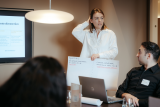
The municipality of Haarlemmermeer is actively working on the realisation of the energy transition in the municipality by, among other things, focusing on sustainable heat supplies. As part of this, a heat initiative has been started in the village of Rijsenhout (east of Haarlemmermeer). This initiative has not been taken up by the market in the past. This has led the municipality to want to take a more active role in the development of District heating in which resident participation is a crucial factor.
During the Knowledge- and Demodag on 13th of March (2025), Kelly Winters and Sophie Keijzer (Hieroo) led a session with the participants that looked at similar successful processes in the past of realising a heat network. The central questions were: What was the success and why was it a success?
Session structure and focus
During the session, the participants split into two groups. Similar processes were then discussed in the two groups in which the success factors of the realisation of energy transition projects were examined. An important example that was discussed in the session was the Schoonschip project in Amsterdam North. This project is a sustainable initiative in which residents have researched how they can live on the water in a circular and sustainable way. This resulted in a community of 46 houseboats that share energy with each other via a Smart Grid that’s cheaper and more efficient.
Outcomes and insights
During the session, various strategies were discussed to strengthen resident participation and make heat network initiatives successful. The most important points from the discussions are:
1. Composition of the initiator group: A diverse and enthusiastic group is crucial. In the Schoonschip project, the core of the success was a group of pioneers who complemented each other in creativity and expertise. Such a group can also be formed in Rijsenhout if they are properly guided and supported.
2. The role of the municipality: The municipality must be aware of the distrust that residents often have towards government institutions. Using an external intermediary or an independent entity can help to reduce this mistrust.
3. Reward and inspire: One way to involve residents in a low-interest topic such as energy is to reward them. Examples are setting up competitions, the use of ambassadors or energy coaches and the organisation of events. Linking opportunities, for example by combining energy transition with social goals such as combating energy poverty, can also play an important role.
4. Using the right moment: An important lesson from the Schoonschip project is to use external circumstances to arouse interest. A crisis, such as rising energy costs or limited energy production, can turn a low interest topic into a high interest topic for people.
5. Governance and structure: A solid Governance structure is essential. The municipality can play a role as a project manager by setting clear deadlines and formulating requirements. This helps both initiators and residents to keep focus and take steps towards concrete results.
Follow up
Do you have a tip to help the municipality of Haarlemmermeer with their district heating plans? Or do you have a question about this project? Contact Ouassim at Ouassim@amsterdaminchange.com or Noor at Noor@amsterdaminchange.com. Later this week on 27th of march, we'll dive into the technical problems that district heating poses, when there just isn't enough space in the underground to build it. If you would like to know more about this, let us know.
Basic Intellectual Property Rights training (Free of charge/Dutch spoken) .
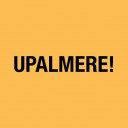
This free of charge training will be given in Dutch!
Protect your ideas and strengthen your competitive advantage with the basic Intellectual Property Rights training.
What will you learn during the training?
- Introduction to different IP rights: get a clear understanding of the IP rights that protect you.
- Real-life examples of collaboration and ownership: Learn how IP rights work in collaborations.
- Freedom to operate: discover how to preserve room to innovate without legal risks.
- The value of technical details in patent publications: Understand how these details give you an advantage in the market.
When: Monday, 9 December 2024 15.30 - 18.00
Location: Ondernemersplein Almere (cityhal Almere), Stadhuisplein 1, 1315HR Almere
Waag Open: energy of the future
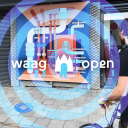
Get up at your feet and join for a summer excursion in Amsterdam-Noord! Although we see more and more solar panels in our streets, as a resident you see very little of the energy transition in the neighbourhood. in Amsterdam, there is already a neighbourhood where the future has started: Buiksloterham in Amsterdam North. Buildings in this area are natural gas-free and almost all of them obtain their energy in a different way.
Be aware that the main language is Dutch!
To make this visible, little glimpses have been placed in the public space. The art objects give virtual glimpses into the devices and installations behind walls and in basements. On the pavement, a 3D painting shows where the district heating network runs, and a viewing tube shows you how full the neighbourhood battery is underground. If you walk past it often enough, you will start to see connections: the weather was really nice today, so the battery is completely full!
During this Waag Open, we'll take a walk alongside different glimpses. All facets of the energy tranisty are covered: we show how deep the boreholes of the thermal storage are and where exactly the heat from the heat network comes from. There is also a focus on solar panels, batteries and heat pumps - of all shapes and sizes! Take a walk with us on Thursday 1 August and you're bound to learn something new about the energy transition!
Programme
| 19:15 - 19:30 | Meetup at Schoonschip (Johan van Hasseltkade 225B, Amsterdam) |
|---|---|
| 19:30 - 19:45 | Welcome & introduction by Waag |
| 19:45 - 21:14 | Walk along the objects |
| 21:15 - 21:30 | Drinks at De Ceuvel |
A Lab POP UP FESTIVAL

Met exposities, live muziek, kunst, theater, fotoreportages, workshops, panel discussies en meer!
Laat je nieuwsgierigheid de vrije loop tijdens het snelste festival van de stad: het A Lab POP UP Festival! Voor alle nieuwsgierige Amsterdammers die in deze schrale tijden kunst & cultuur, duurzaamheid en sociale innovatie hoog in het vaandel hebben. Kom kijken hoe onze ruim 300 members aan een zelfredzame toekomst werken. Kinderen? Neem ze mee, want het wordt een feestje!
Inkijkjes in de energietransitie: feestelijke opening
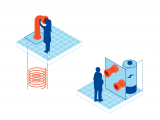
Het valt niet meteen op, maar in Amsterdam Noord is de toekomst al begonnen. De wijk Buiksloterham loopt internationaal voorop in de energietransitie. Gebouwen in de buurt zijn aardgasvrij, en verkrijgen hun energie bijna allemaal op een andere manier. Als voorbijganger of bewoner zie je daar nu weinig van.
Het project ‘Inkijkjes in de Energietransitie’ brengt daar verandering in. Met schilderingen en kunstobjecten op straat geven we virtuele inkijkjes in de apparaten en installaties achter de muren en in kelders. In kijkbuizen met animaties wordt de werking van een warmte-koude-opslag, of het stadswarmtenet, je in een minuut uitgelegd.
De nieuwe technieken mogen gezien worden! Door een wandeling langs de verschillende inkijkjes kom je meer te weten over de verschillende facetten van de energietransitie.
Zo maken we de energietransitie tastbaar, en de discussie erover concreter.
Kom je naar de opening? Op donderdag 13 juni worden de Inkijkjes in de Energietransitie officieel geopend. We presenteren de installaties aan alle betrokkenen: van expert tot bewoner, en aan de buren.
Wanneer: Donderdag 13 juni, 16:00 - 19:00 uur
Waar: Asterdwarsweg 5, Amsterdam Noord
Meld je aan: door te mailen naar floortje [at] waag [punt] org
Het concept ‘Inkijkjes’ komt voort uit de artistieke oproep van Waag Futurelab en een intensief buurtonderzoek (bezoeken, interviews, workshops met buurtbewoners) samen met de geselecteerde ontwerper Tessa Steenkamp en haar design studio Bits of Space.
Ondanks congestie toch bedrijvigheid op Schiphol Trade Park

Wat in oktober 2020 begon als een urgent probleem – in het gebied waar Schiphol Trade Park in ontwikkeling was was geen extra transportcapaciteit meer mogelijk en de geplande bouw en uitbreiding moest noodgedwongen stoppen – is inmiddels opgelost. Onze baanbrekende virtuele netoplossing is daar nu namelijk ruim twee jaar in werking, en met succes: de bedrijven op Schiphol Trade Park zijn operationeel, breiden uit, en elektrificeren ondanks de netcongestie in het gebied.
Congestie op Schiphol Trade Park
Een blik op de congestiekaart maakt duidelijk dat Schiphol Trade Park in een door congestie grotendeels op slot gezet gebied ligt. Op het middenspanningsnet is geen extra capaciteit beschikbaar voor het transporteren van elektriciteit. Dat betekent dat er niet meer ontwikkeld wordt: een bedrijf krijgt namelijk wel een aansluiting, maar geen transportcapaciteit. Dit is niet alleen een probleem voor de bedrijven die zich hier willen vestigen, maar ook voor gebiedsontwikkelaar SADC (Schiphol Area Development Company), dat in 2020 nog de ambitie had om het meest duurzame business park van Europa te worden (en in 2023 door de BREEAM-NL Outstanding certificering zelfs het meest duurzame logistieke business park van de wereld is!). De ontwikkelaar wilde voorkomen dat bedrijven afzonderlijk een eigen oplossing zochten en er een wildgroei aan gasgeneratoren met de daarbij behorende uitstoot zou ontstaan. SADC zag dat dit slimmer, goedkoper en duurzamer kon, door op een innovatieve manier partijen te verbinden en te laten samenwerken. Bedrijven kunnen daardoor bouwen, uitbreiden en elektrificeren. Over de aanloop naar het project lees je meer op onze projectpagina.
Een doorbraak: de virtuele netoplossing
Alle bij de coöperatie aangesloten bedrijven delen hun eigen transportcapaciteit met elkaar. Zo maken ze slim gebruik van de gereserveerde ruimte. STELLAR Grid Management leest continu de slimme meters uit en stuurt de energiesystemen (zoals zonnepanelen, energie-opslag, en generatoren) achter de meter aan. Bovendien zorgen we voor de financiële afhandeling van deze aansturing, zodat de deelnemende bedrijven elkaar compenseren voor gebruikte elektriciteit en voor het beschikbaar stellen van hun stuurbare energiesystemen.
De resultaten van een jaar virtueel net
Het virtuele net is twee jaar actief. In het eerste jaar sloten zich nog gefaseerd bedrijven aan bij het collectief. De resultaten van dat jaar zijn voorspoedig, maar niet helemaal volledig.
Nu we een tijdje bezig zijn, delen we met vertrouwen onze resultaten. Voor deze resultaten keken we naar 2023. Zo nemen we dus alle seizoenen en bijbehorende energievraag mee in deze analyse.
Het collectief wordt goed benut: in 2023 is 2.104 MWh aan elektriciteitslevering extra mogelijk gemaakt door het delen van de capaciteit binnen het virtuele net. Zonder deze slimme oplossing hadden heel veel stuurbare energiesystemen, zoals batterijen en generatoren, deze elektriciteit moeten leveren. In het collectief nemen in totaal zeven bedrijven deel die weinig of geen netcapaciteit hebben. Dankzij deze slimme oplossing kunnen de bedrijven gebruikmaken van de beschikbare ruimte en opwek van de buren.
Om zeker te zijn van voldoende elektriciteit binnen de gestelde limieten hebben meerdere bedrijven geïnvesteerd in batterijen en gas- en dieselgeneratoren. Het collectief gebruikt die middelen als er een tekort aan capaciteit is. De generatoren dienen vooral als achtervang. Voordat STELLAR deze aanstuurt, bepaalt het systeem of de aangesloten batterijen kunnen voorzien in het verwachte moment van schaarste. Als de batterij niet voldoende is, schakelt STELLAR automatisch een generator in. In heel 2023 is ertwee keer een generator ingezet om binnen de netlimiet te blijven, voor in totaal 2 uur. Toen de generatoren aangingen waren de batterijen nog niet operationeel, anders waren die generatoren waarschijnlijk niet nodig geweest.
Zonder virtueel net hadden deze partijen moeten investeren in elk een eigen generator (en eventuele back-up generator). Die generatoren hadden gezamenlijk tot 31.000 draaiuren gemaakt. Dat is gelukkig voorkomen. Er is hiermee voor 468.000 m3 minder gas verbruikt, en daardoor is er lokaal 842 ton CO2 minder uitgestoten door generatoren.
Het virtuele net is dus een solide oplossing voor congestiegebieden. Dankzij de slimme aansturing zijn zeven bedrijven operationeel die zonder de virtuele netoplossing hadden moeten uitwijken naar een andere locatie in Nederland of daarbuiten,terwijl een aantal van hen al aan het bouwen was. En er is een enorme hoeveel CO2-uitstoot voorkomen.
De toekomst van Grid Management
We zijn trots op ons virtuele net bij Schiphol Trade Park. We horen ook een enorme urgentie in de markt: veel partijen worstelen met netcongestie en zoeken naar een vergelijkbare oplossing. Maar de toekomst van Grid Management is niet hapklaar. Het project bij Schiphol Trade Park is een pilot, en de voorwaarden van een standaard contractvorm voor een dergelijke collectieve oplossing (groeps-transportovereenkomst) zijn nog niet definitief vastgesteld.
Niet alleen bij Schiphol
Schiphol Trade Park is zeker niet de enige plek in Nederland waar sprake is van congestie. Eerder dit jaar lanceerden we onze oplossing bijvoorbeeld ook in het Zwolse Hessenpoort. Heb jij ook last van congestie? We denken graag met je mee. Neem contact met ons op.
⚡️Powering the Future - Discussions on sustainable solutions for our digital dependency

Powering the future
Sustainable solutions for our digital dependency
Cloud computing does not take place in the sky. Gigantic data centers are popping up all around us, home to new AI services and Bitcoin mining operations that consume more energy than the entire country of the Netherlands annually. Code using Python & Java (the most popular) can use up to 45x times as much energy as other programming languages. Whether you are a programmer or user, our dependence on all this processing power is creating a new energy competition between our homes / businesses and our digital lives. What are some examples for sustainable development? Join us April 18th where we talk to industry pioneers that are developing serious solutions to solve our addiction to energy.
AGENDA:
17:00 Welcome drinks - Welcome drinks to break the ice and network a bit with fellow attendees.
17:30 Opening and Welcome - Pinch / Appsterdam
17:35 Kick-off Speaker - Tom Moran - Technology and Sustainability Strategy Consultant. Tom has been working in sustainability for over 30 years and technology for over 20 years. Tom is going to talk about why “the cloud” is not more sustainable, carbon footprints don’t matter, net zero targets are meaningless and why you should be skeptical of the AI hype machine.
Tom will also talk about what IT people who care about the environmental impact of their work need to understand and do to make a difference.
18:15 Food is served
19:00 Luisa García Montoya - Product Manager DX at AMS-IX. Luisa is passionate about leveraging technology to drive meaningful change. Drawing from her experience interacting with a diverse array of ISPs, telecoms, cloud providers, content delivery networks, and other participants involved in the digital ecosystem, Luisa will delve into the urgency for more sustainable code. The rise of ChatGPT/AI has created significant challenges for energy consumption. Recent laws and regulations are beginning to enforce standards to counteract these challenges. What aspects will programming practices need to account for? In her talk, Luisa discusses these challenges and opportunities, sharing some hard realities and examples, such as how mutualized infrastructures and data sharing can help save energy and money while also encouraging creativity in programming.
20:00 Closing and networking drinks.
Demoday #22: How can we continue to facilitate homeowners in driving the energy transition?
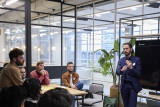
Grid congestion is becoming increasingly significant and will start to pose a problem in the low-voltage network in the coming years. This will prevent homeowners from transitioning away from gas, result in low efficiency for their solar panels, and could make it impossible to have a charging station at their doorstep. Alliander does not want to hinder the energy transition. Therefore, they are looking for a way to involve homeowners in the issue of grid congestion and provide solutions that are still feasible with a crowded grid.
In the energy work session on the 14th of December, Wouter van Rooijen (Alliander) discussed the challenges related to grid congestion. From 2030 onwards, it is expected that a significant portion of the low-voltage network will experience both over- and under-voltage. While the network will be reinforced as quickly as possible, the lack of labour capacity is also prompting the consideration of alternative solutions.
The solution that emerged from Wouter's co-creation process was WijkWise. In this work session, Wouter aimed to validate the WijkWise concept and find parties that could contribute to its development and market implementation. Dave van Loon from Kennisland moderated the session.
WijkWise – Understanding the neighbourhood's grid situation
The WijkWise concept focuses on three problems:
- The growth of grid congestion at low-voltage
- Homeowners' uncertainty about making sustainable investments. For instance, because they may not know if their solar panels will yield a good return.
- Homeowners' lack of awareness regarding the impact their choices have on the stability of the grid.
The proposed solution:
"With WijkWise, Alliander continues to facilitate homeowners in making their homes more sustainable. Alliander does this by providing insight into the neighbourhood's grid situation and recommending the best investment. Residents can make informed choices that contribute to payback time, comfort, and certainty. A good choice benefits both the homeowner and the grid operator."
The idea is to provide more insight into the neighbourhood's grid situation and offer tailored advice for home sustainability. This way, homeowners can determine whether they should invest in insulation, a heat pump, or solar panels.
Alliander does not want to develop this concept alone, but is seeking partners to bring this concept to market.
Discussion
After the concept presentation, a brief discussion followed. The main questions raised were:
- Can providing insight into the neighbourhood's grid situation have (negative) effects on the housing market?
→ They don't know yet; further investigation is needed. - Can this data be shared freely?
→ The data shared will be at the neighbourhood level (transformer level) and not in real-time (monthly). If there is user data involved, consent must be obtained. - What behaviour change do you expect?
→ That, during the investment moment, consideration will be given to the grid situation for the most advantageous investment.
After the discussion, we worked in groups with the Empathy Canvas from Kennisland to view the WijkWise concept from the perspective of the homeowners. This tool helped us really view the problems from the perspective of a homeowner.
Empathy Mapping
In three groups, we delved into the homeowner's situation. The recurring themes in the empathy maps were:
- A sense of unfairness for the homeowner. They invest in sustainability and are rewarded with grid congestion problems.
- A feeling of uncertainty for the homeowner. They want assurance that their investment will yield results.
- Little trust in the grid operator and the government. First, everyone had to get solar panels, and now suddenly it doesn't fit, and net metering is being discontinued (or not?)
- Limited understanding by homeowners because they find it very complicated and don't want to delve into it. It's not an urgent problem for them.
- Collaboratively seeking solutions can be very positive, but can also lead to friction.
Alliander plans to take the next steps with this concept in 2024. In 2024, they are planning to do the follow-up research, make the minimal viable product, and launch the first version of the product at the end of the year.
Do you know of any stakeholders that absolutely need to be involved, or would you like to be involved in the implementation of the WijkWise concept? Please contact Noor at noor@amsterdamsmartcity.com. Special thanks to Wouter and Dave for this interesting session.
De energietransitie vraagt om eerlijkheid en duidelijke randvoorwaarden
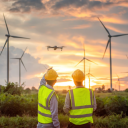
De energietransitie is een van de grootste uitdagingen van deze tijd. Nederland heeft tot nu toe goede stappen gezet, maar om de klimaatdoelen te behalen, moet er nog een flinke inhaalslag worden gemaakt. Wat is er nodig en wat is de rol van de overheid in deze transitie? Sander Oudmaijer en Ariën de Klerk, beiden werkzaam bij Monitor Deloitte, doen aanbevelingen gebaseerd op onze onlangs gepubliceerde Energie Transitie Monitor.
We hebben in Nederland de afgelopen decennia goede vooruitgang geboekt, máár om de klimaatdoelen van 2030 en daarna te halen, is er nog een flinke versnelling nodig, constateren Sander Oudmaijer, Director bij Monitor Deloitte, en Ariën de Klerk, Manager bij Monitor Deloitte. Ze baseren zich op de Energie Transitie Monitor (ETM) die Deloitte begin september gepubliceerde. Om de juiste keuzes te kunnen maken, hadden professionals uit de industrie, academici en beleidsmakers al langer behoefte aan een helder beeld en een gemeenschappelijke feitenbasis over de status van de energietransitie. De ETM biedt die huidige stand van zaken over de energietransitie in Nederland en laat zien wat ons te wachten staat.
Omvang van de Nederlandse emissies
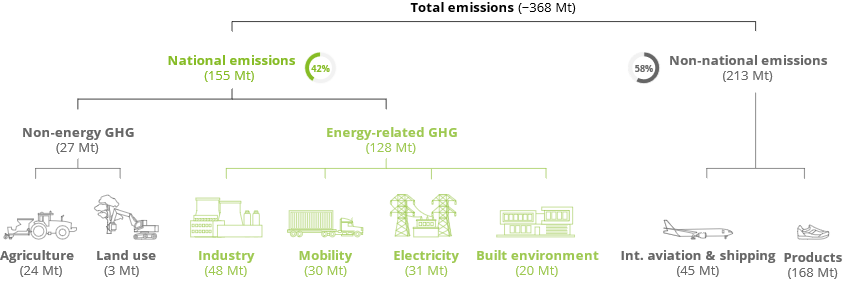
De Klerk: “Tot nu toe hebben we keuzes gemaakt die relatief weinig pijn deden. Het grootste deel van de vooruitgang boekten we door laaghangend fruit te plukken, en mee te liften op ontwikkelingen die zich sowieso al voordeden. Denk aan het terugdringen van de industriële productie, efficiëntiemaatregelen en het feit dat we meer gebruik maken van bestaande technologieën zoals zonne- en windenergie. Om de klimaatdoelen te halen, ontkomen we er niet aan om nu ook keuzes te gaan maken die pijn doen.”
Oudmaijer: “Om de doelstellingen uit het klimaatakkoord in 2030 te halen, moeten er 570 laadpalen per dag worden geïnstalleerd en moeten er tien emissievrije bussen per week bij komen. Daarbij zouden we de verwarming van 600 huizen per dag moeten elektrificeren en moeten we tot 2050 om de dag één windmolen bouwen. Om dat voor elkaar te krijgen zullen er fundamentele keuzes gemaakt moeten worden.”De Klerk: “De pleisters om kleine tekortkomingen te repareren raken op.”
Vertel het eerlijke verhaal
De rol van de overheid in de energietransitie is dan ook van groot belang, stellen Oudmaijer en De Klerk. De overheid schept de voorwaarden die nodig zijn om de doelen te kunnen behalen, en ze draagt tegelijk bij aan het vertellen van 'het eerlijke verhaal'. Oudmaijer: “Het is belangrijk dat er nu subsidies zijn voor elektrische auto's en allerlei duurzame maatregelen, maar dat houdt een keer op. De energietransitie gaat zowel burgers als bedrijven geld kosten. Dat eerlijke verhaal moet verteld worden.”
"De vraag is niet of we nog een windmolenpark gaan bouwen op zee óf op land, het moet allebei."
De Klerk: “Bovendien is het nog vaak een of/of-discussie, maar de vraag is niet of we nog een windmolenpark gaan bouwen op zee óf op land, het moet allebei. Daarbovenop zijn investeringen in andere vormen van energievoorziening, zoals bijvoorbeeld kernenergie, noodzakelijk. Ook dat is het eerlijke verhaal: het is en/en.”
Oudmaijer: “De ETM laat duidelijk zien wat er moet gebeuren. Een belangrijke vraag is vervolgens hoe je gemeenschappen meekrijgt met al deze ontwikkelingen. Eigenlijk wil niemand een windmolenpark in zijn achtertuin. Als overheid moet je daarom nadenken hoe je dit zo goed mogelijk kan faciliteren. Wellicht moeten de voordelen van wind- en zonne-energie op een directere manier terugvloeien naar bepaalde gemeenschappen, zodat zij enthousiaster worden en meer betrokken raken. Zoals bij het windpark Veur de Wind, waar omwonenden meeprofiteren van het park, in plaats van dat het ze met dwang werd opgelegd.”
De Klerk: “Al dit soort zaken vragen om een heldere visie vanuit de overheid. Het moet voor investeerders en bedrijven duidelijk zijn wat ze van de overheid kunnen en mogen verwachten en hoe die hen kan helpen. De overheid schept duidelijke randvoorwaarden voor de langere termijn. Als we om de dag een windmolen willen bouwen, dan moet onder meer de termijn om een vergunning te krijgen voor de bouw van een windmolenpark vele malen sneller dan nu het geval is.”
Win-winsituaties
We hebben in korte tijd veel werk te doen. Niettemin zijn volgens Oudmaijer en De Klerk de juiste bouwstenen aanwezig om dit succesvol aan te pakken. Denk bijvoorbeeld aan een innovatiecultuur, een al lang bestaande industriële sector en een toonaangevend onderwijssysteem. De uitdaging die voor ons ligt, is om al onze capaciteiten op vernieuwende wijze te orkestreren en de transitie te versnellen op een manier die samenleving, klimaat en economie ten goede komt.
De Klerk: “Wat je niet wilt is dat bedrijven hun deuren in Nederland sluiten en in een ander land met dezelfde uitstoot verdergaan. De vraag is dus hoe we ervoor zorgen dat we economische daad- en draagkracht houden zonder daarbij onze verantwoordelijkheid ten aanzien van het klimaat te verzaken. Oftewel, we moeten opnieuw kijken wat onze rol is in de energietransitie en waarin we willen investeren als B.V. Nederland. Belangrijk is dat die keuzes passen bij de capaciteit van ons land en hetgeen waar we goed in (willen) zijn.”
Oudmaijer: “We zijn in Nederland al een tijd bezig met waterstof, mede om de grote industrie te faciliteren. Als we ervoor kiezen om daar vol op in te zetten, dan zou de overheid met een duidelijke visie moeten komen. Stil staan bij vragen als: Op welke type waterstofdragers zetten we in? Waar willen we waterstof wel en niet voor gebruiken, en hoe gaan we dat als overheid faciliteren? De overheid zal een faciliterende rol moeten pakken, zodat bedrijven een afgewogen investeringsbeslissing kunnen maken. Bijvoorbeeld door te zorgen dat er sneller vergunningen worden afgegeven, het duidelijk is waarvoor we het willen gebruiken en door locaties aan te wijzen waar fabrieken gebouwd kunnen worden.”
De Klerk: “Een ander idee is om het North Sea Consortium te versterken door een visie en een uitvoeringsplan te creëren. Dat positioneert de Noordzee als een krachtcentrale van de Noordwest-Europese offshore op het gebied van windenergie- en waterstofproductie. Op die manier zet je Nederland neer als krachtpatser en dient het als een mondiale blauwdruk voor een succesvolle energietransitie.”
Oudmaijer: “Begin hiermee door als overheid een duidelijke visie neer te leggen en samen met het bedrijfsleven pilotprojecten te starten om uit te vinden wat wel en niet werkt. Een iteratief proces waarbij overheid en bedrijfsleven hand in hand de meest succesvolle initiatieven verder brengen, waardoor duidelijk wordt wat daadwerkelijk impact oplevert. De tijd om het laaghangend fruit te plukken is voorbij, het gaat nu om heldere keuzes en concrete acties!”
6th Cassini Hackathon in Amersfoort

The CASSINI Hackathons take place simultaneously in 11 different countries. The 6th edition is scheduled for November 3-5, with events happening both in Amersfoort and online in the Netherlands. In Amersfoort, this exceptional event is co-organized by dotSPACE foundation and Royal Haskoning DHV.
The 6th edition of the hackathon revolves around three key themes:
- <strong>Supporting sustainable infrastructure development.</strong> A strong national infrastructure facilitates critical services, promotes opportunities, and stimulates economic growth. Can you create a solution that supports the development of renewable energy, transport and mobility, or connectivity infrastructure?
- Strengthening food security and access to clean water. Tackling the urgent global issues rooted in the scarcity of food and clean water, we’re challenging participants to explore how space technologies can be better prepared for humanitarian crises and more effectively manage precious resources.
- Understanding and forecasting forced migration. In this challenge, we’re looking for solutions that will help authorities to predict population movements from vulnerable areas. How can space data help us manage logistics, resources, and transportation during difficult times?
Who Can Participate?
The CASSINI Hackathon is open to students, entrepreneurs, engineers, designers, researchers, and anyone interested in space technologies, international development, and humanitarian activities. To participate, you must be 18 or older and reside in an EU Member State, Norway, Switzerland, or Iceland. Teams should consist of at least 3 members and can have a maximum of 8.
For your convenience, we’ve arranged accommodations for on-site participants at the Stayokay Hostel in Soest.
ATELIER - Positive Energy Districts

ATELIER is an EU funded project about AmsTErdam and BiLbao cItizen drivEn smaRt cities, aiming to create and replicate Positive Energy Districts (PEDs) within eight European cities. ATELIER showcases innovative solutions that integrate buildings with smart mobility and technologies to create rather than consume energy in its two Lighthouse Cities Amsterdam (Netherlands) and Bilbao (Spain). The Fellow Cities of ATELIER, Bratislava (Slovak Republic), Budapest (Hungary), Copenhagen (Denmark), Krakow (Poland), Matosinhos (Portugal), and Riga (Latvia), will replicate and adapt the successfully implemented solutions and thus serve as testbeds for future smart cities. Overall, ATELIER will thus generate an energy surplus of 1340 MWh of primary energy and save 1,7 kt of CO2 and 23 t of NOx-emissions.
To achieve successful implementations of energy saving measures, ATELIER puts citizens at the centre of all its activities: residents (<9000), local initiatives and energy communities will be included in decision-making processes and activities and will be strongly engaged in the development of the technical solutions throughout the project. Citizens will be involved in the Innovation Ateliers to create a maximum impact for the PEDs.
30 partners from 11 countries are working in 10 work packages.
Learn more about ATELIER at its public website (http://www.smartcity-atelier.eu/) or via the ATELIER Twitter and LinkedIn channels. Sign up here (link follows) for the ATELIER newsletter. Follow the project virtually and don’t miss an opportunity to come talk to its partners at events to learn more about how ATELIER will improve the life of its citizens and the liveability in its cities!
Matchmaking-evenement Toekomstbestendige kunstgrasvelden
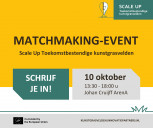
Ben je een ondernemer met een duurzaam product of duurzame dienst en wil je écht impact maken? Dinsdag 10 oktober organiseert de gemeente Amsterdam in samenwerking met gemeente Haarlem het matchmaking-evenement voor het unieke aanbestedingstraject Scale Up Toekomstbestendige kunstgrasvelden. Elke ondernemer die bij kan dragen aan innovatieve en duurzame toepassingen op en onder kunstgrasvelden, is welkom!
Tijdens deze middag maak je kennis met het project 'Scale Up Toekomstbestendige Kunstgrasvelden' en word je geïnspireerd en uitgedaagd hoe jouw bedrijf bij kan dragen aan deze revolutie. Je ontmoet andere waardevolle en gedreven ondernemers met dezelfde visie, die bereid zijn samen te werken aan de toekomst van sportvelden. Wie weet vind jij wel de perfecte samenwerkingspartner! Meld je direct aan.
Datum: dinsdag 10 oktober 2023
Tijd: 13.30 – 18.00 uur
Locatie: Johan Cruijff ArenA, Amsterdam
Programma
13.30 - 14.00 Inloop
14.00 - 14.45 Welkom en keynote spreker
14.45 - 15.30 Presentatie Scale Up aanbesteding
15.30 - 15.50 Pauze
15.50 - 17.30 Speeddating & marktplein
17.30 - 18.00 Netwerkborrel
Wie zoeken ze?
Amsterdam en Haarlem zoeken verschillende partijen, die samen (in consortia), innovatieve oplossingen ontwikkelen voor de verschillende ambities. Het doel: duurzame kunstgrasvelden van circulaire materialen, die bijdragen aan een verbeterde waterhuishouding, een betere aanpak van hittestress en een algemene positieve bijdrage aan het energievraagstuk. Denk bijvoorbeeld aan een systeem voor wateropslag of composteerbare materialen. Dus ook voor bedrijven en innovators die momenteel niet actief zijn in de kunstgrasbranche kan deze opgave interessant zijn!
Samen maken we impact
Dat is het motto! Benoemde gemeentes willen, in samenwerking met marktpartijen, een positieve verandering teweegbrengen in de negatieve effecten van kunstgras. En met meer dan 200 sportvelden in Amsterdam en Haarlem, kan er veel impact gemaakt worden bij het verduurzamen van de stad en andere steden.
Lees meer over dit project op: kunstgrasvelden.innovatiepartners.nl
Disclaimer: Het is niet verplicht om deel te nemen aan het matchmaking event om mee te kunnen doen met de aanbesteding. Het project wordt deels gefinancierd door het LIFE Programme van de Europese Unie. De weergegeven standpunten en meningen zijn echter uitsluitend die van de auteur(s) en weerspiegelen niet noodzakelijkerwijs die van de Europese Unie of CINEA. Noch de Europese Unie, noch de subsidieverlenende autoriteit kan hiervoor verantwoordelijk worden gehouden. Aan deze artikelen kunnen geen rechten worden ontleend, de aanbestedingsstukken bij de publicatie van de aanbesteding zijn leidend.
The next step for Local Energy Systems
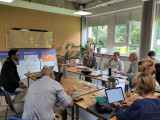
Thursday, the 30th of August, we had the first follow-up session about Local Energy Systems (LES) since the Transition day session in June. Over the summer Omar Shafqat (HvA, ATELIER), dr. Renée Heller (HvA), and Lennart Zwols (municipality of Amsterdam), have worked on finding a solution to the barriers to scaling up LES. They focused on the barrier of sharing information and learnings of LES projects. In this session, Omar presented a framework that could help overcome this barrier.
A barrier to scaling up LES: Lack of knowledge
In the previous session, we discussed how the difficulty with starting a new LES project is often that the information on how to do this is not readily available. Many pilots have been done, or are still ongoing, and there are definitely reports on the learnings of these pilots. Unfortunately, these learnings are not always available to everyone, and if they are, quite difficult to find and aggregate.
Lennart therefore proposed to make a framework in which we can gather all the information on LES pilots and projects, so we have a central place for the collecting and sharing of information. Omar and Renée have created this framework, which Omar presented in this session. The framework has three objectives:
1. Collecting the learnings of the pilots in one place.
2. Defining the gaps in our knowledge.
3. Creating a starting point for people who want to create their own LES.
Definition of a Local Energy System
To properly create a framework in which various information of relevant LES projects can be collected, it was necessary to have a good definition of a LES. Omar presented the definition as follows:
A local energy system is an interactive, non-linear system that must contain:
- Local generation
- Controllable demand
- Storage
- Energy Management Systems
- Energy communities
Hans Roeland Polman (AMS) commented that he was missing the infrastructure in this definition. Omar clarified that the lines between these five entities symbolize the infrastructure and that it is indeed an important component of LESs.
When we speak of LES it is always a balancing act. Different stakeholders have different objectives for implementing a LES, maximizing renewables, minimizing costs, flexibility/congestion, grid dependence, etc. This implies that the aspects of a LES are of differing importance to stakeholders, which is important to take into account with information gathering and sharing.
The first version of the framework for collecting information
After discussing the definition of LES, we dived into the framework. The goal of this framework is to have one format in which we collect information and learnings from all the LES pilots and projects (starting with the ones in our own network). This will allow us to speak a common language, easily compare projects, identify stakeholders and their interests, see where the knowledge gaps are, and more easily find specific information about LES.
Note: This framework is not the interface for the end-user. The framework should be used to catalogue information and learnings so that we have the information on all the different projects in the same format. We can then use this to build a user interface that end-users can interact with. How to best do this is still a topic of discussion.
The framework is presented below. On the x-axis, you can see the time scale. On the left you have the long-term (planning) phase, and on the right the short-term (management) phase.
On the left side, you can see the four areas in which the framework is divided:
- Policy
- Energy markets
- Energy systems
- Community/user aspects
The colour-coded third dimensions show which blocks relate to certain topics of interest, and should have information added on this topic. The topics of interest that have been added now are:
- Congestion
- Energy balance
It might be interesting to add others as well.
It was suggested by the group that electricity/heating might also be an interesting topic to add. Hans (AMS) also suggested that it would be interesting to add information about local infrastructure, such as a local heat network.
Discussion and questions
After the presentation of the framework a discussion followed. Many questions were raised which require further examination. A few of the key questions were:
- What should the scope be of this framework? Are we just looking at our own region, or do we want it to be used on a much larger scale?
- How do we connect to the other organizations and projects to this framework, and refrain from doing double work?
- Who is the owner of this framework and will keep it up to date?
- To make this framework usable for project managers, it should have a clear template that can be filled in. Who is going to make this, and how do we ensure that project managers of LES projects fill this in?
Next steps and call to action:
There are still many questions that need to be answered, and we will continue the research and learn by doing. We will start with the ATELIER and the LIFE project, to see if we can put them into this framework. This will be done by Omar (HvA, ATELIER), and Hans (AMS, LIFE). They will also create the first version of a template in which the information can be collected so that project managers can fill out this information. This will then be tested with the project managers of the LIFE project to see if the template and framework are indeed workable.
This will give a good starting point to see if the framework is suitable for the collection of information and learnings of LES projects. However, it will be far from complete. The ATELIER and LIFE projects don’t contain all the topics to properly test the framework and create templates for everything. We therefore need more partners with LES projects that can help test and develop this framework.
So if you are working on a Local Energy System project, and you would like to help further develop the framework, by giving feedback on the framework itself or using your project to validate the effectiveness of the framework, please let us know.
SAVE THE DATE | 10 Okt. - Kans voor ondernemers met duurzame oplossingen

Ben je een ondernemer met een duurzaam product of dienst en wil je écht impact maken? Kom dan naar het matchmaking evenement voor het unieke aanbestedingstraject Scale Up Toekomstbestendige kunstgrasvelden van de Gemeente Amsterdam en Haarlem. Elke ondernemer, die bij kan dragen aan innovatieve en duurzame toepassingen op en onder kunstgrasvelden, is welkom!
Datum: dinsdag 10 oktober 2023
Tijd: 13.30 – 18.00
Locatie: Johan Cruijff ArenA
Aanmelden
Meld je hier alvast aan als deelnemer van het evenement. Het definitieve programma volgt.
Tijdens dit evenement:
- Maak je kennis met het project Scale Up Toekomstbestendige kunstgrasvelden;
- Kom je erachter hoe ook jouw bedrijf hieraan kan bijdragen;
- Ontmoet je andere ondernemers met dezelfde visie;
- Word je geïnspireerd en uitgedaagd om out-of-the-box te denken;
- Vind je de perfecte match om later mee te doen aan de aanbesteding.
Meer informatie
Voor dit evenement zoeken we expliciet bedrijven uit diverse branches, die samen willen werken om het sportveld van de toekomst te ontwikkelen. Kijk hier voor meer informatie over dit project.
Disclaimer: Het is niet verplicht om deel te nemen aan het matchmaking event om mee te kunnen doen met de aanbesteding.
Met vriendelijke groet,
Team Scale Up Toekomstbestendige kunstgrasvelden
Transition day 2023: Local Energy systems, scale up, scale up, scale up

Energetic for energy
The technology is here. People and organizations are there. We have a lot of learnings from innovation pilots like Live and Atelier: we're all set. And yet, scaling up local energy systems like Live and Atelier seems to be incredibly difficult. What are the obstacles and barriers to scaling up these initiatives? These questions were the focus of the working session "local energy systems, scale up, scale up, scale up”. The partners unanimously recognized the issue of scaling up as it affected all of them, and enthousiastically engaged in the work session.
Barrieres for upscaling
Together we searched for the actual challenges where local energy systems can be a solution, and the barriers for upscaling. We looked at the first actionable follow-up steps to achieve the required upscaling.
We chose a <em>chair battle</em> as work format and had an open and honest conversation about the challenges we face. It was fascinating to see that sometimes the different stakeholders, despite having the same goal, cannot come to an agreement and this can lead to considerable frustration.
What we learned?
A lot! The picture report says more than a thousand words, but in short:
· We can only solve this challenge together; and that’s difficult
· Citizens and companies often do not know where to go and often do not know the existing possibilities
· We have the same goal, but there are many different interests
· The solutions are already there
And now?
We will continue the topic with great energy in the coming period and try to set up a fixed program structure to keep the development up to speed.
Do you want to know more about this challenge? Please let me know. patricia@amsterdamsmartcity.com
Question hour: Accelerating the energy transition

As DRIFT, we’re noticing that changemakers in the energy transition are currently facing challenges that we could only dream of years ago – or that kept us up at night. In this question hour, you get to ask transition experts Gijs Diercks and Noortje Flinkenflögel all sorts of questions about the energy transition in general and our course Versnelling van de Energietransitie in particular.
Stand-up - Comedy for Climate (reprise)
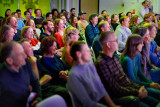
Een avondje lachen
Klimaatopwarming is niet het meest grappige onderwerp. Toch proberen we daar door middel van een stand-up comedy avond voor één keer verandering in te brengen. Waarbij we lachen om onszelf en het klimaat. Met alleen een microfoon zetten de comedians van Het Comedyhuis zware klimaatonderwerpen om in luchtige grappen. Een lekker avondje lachen dus. Want lachen is gezond! Om daarna met goede moed en op volle kracht te werken aan de oplossing.
Over Het Comedyhuis
Comedy for Climate wordt georganiseerd door Het Comedyhuis. Een van de oudste stand-up comedy gezelschappen van Nederland. Sinds 2009 organiseert de groep comedyshows in het land, schrijven ze teksten voor TV programma’s als de Avondshow van Lubach en helpen ze beginnende comedians om hun eerste stappen op het podium te zetten met hun beproefde stand-up comedycursussen.
Tijdens Comedy for Climate kun je genieten van de grappen van:
- Andries Tunru
- Pieter Jouke
- Wouter Monden
- Tim Kroezen
Praktisch
Voor een bezoek aan dit evenement in De Studio reserveer je een ticket via de website van NEMO. De toegangsprijs is € 7,50.
Comedy for Climate start om 20.00 uur en en duurt ongeveer 1 tot 1,5 uur. Voorafgaand aan het evenement kun je vanaf 19.00 uur de tentoonstelling Energy Junkies bezoeken.
Op vertoon van een kortingspas ontvangen pashouders voorafgaand aan de activiteit een gratis drankje. Deelnemende passen zijn: Museumkaart, VriendenLoterij VIP-KAART, Stadspas Amsterdam, CJP pas en Collegekaart.
De Studio van NEMO is een extra locatie van NEMO Science Museum op het Marineterrein in Amsterdam. De programmering is speciaal voor volwassenen.
Stay up to date
Get notified about new updates, opportunities or events that match your interests.
